Homeowner’s Guide to Types of Driveways
From dirt-rut wagon tracks to the elegant brick pavers of Thomas Jefferson’s Monticello, Americans have been balancing cost and appearance when choosing driveway materials for centuries. Today, new materials allow for a staggering variety of choices to accommodate almost every possible budget and driveway design preference.
Here are pros and cons of seven of the most popular driveway options, with a special focus on cost, longevity, maintenance, climate appropriateness and sustainability.
Asphalt Driveway (AKA Blacktop)
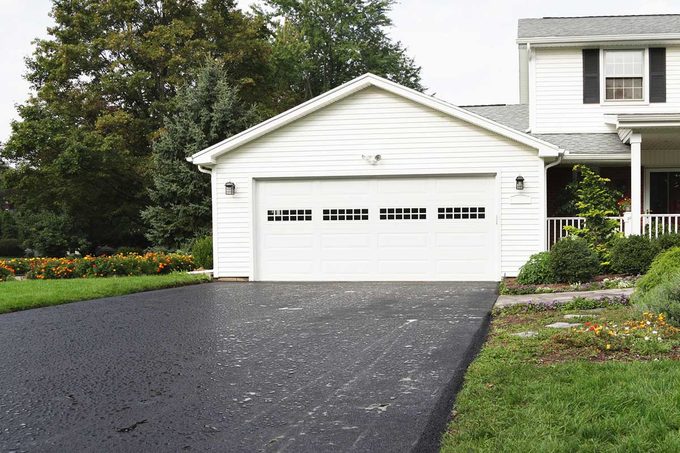
Asphalt pavement is one of the most common materials used for driveways in the U.S. A favorite of homeowners and school builders everywhere, asphalt is affordable and quick to install. It’s a great choice for large areas and creates a smooth, uniform appearance.
Pros
- Cost: Asphalt driveways are relatively affordable, ranging from $5 to $12 per square foot installed.
- Maintenance: Easy to patch and repair small damage in a way that isn’t readily visible.
Cons
- Lifespan: Asphalt driveways have a life of 20 to 25 years, shorter than most other materials on this list.
- Climate: Blacktop absorbs heat, making it hot to the touch (especially on bare feet). Very high temperatures can cause it to soften, sticking to shoes and allowing cars to leave tire tracks.
- Sustainability: Asphalt is a petroleum product. Although there have been advances in asphalt recycling, it is one of the least environmentally friendly driveway options.
Concrete Driveway
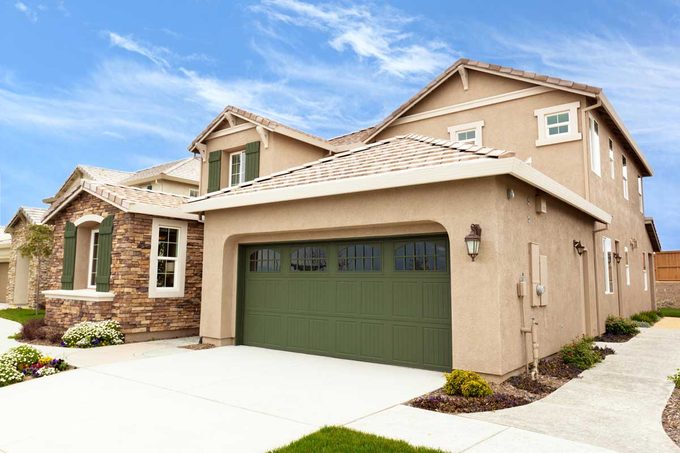
The other most popular choice for driveway material is concrete. A robust material that can take a beating from the weather, concrete is a great choice for any climate.
Pros
- Cost: Usually between $5 and $8 per square foot installed.
- Longevity: Lifespan up to 40 years.
- Maintenance: Relatively little regular maintenance.
- Climate: Suitable for hot or cold environments. (In snowy conditions, take care when applying ice melt.)
Cons
- Cracks: All concrete will crack eventually.
- Maintenance: When something does go wrong, a repair can be difficult to patch in or hide.
- Sustainability: Concrete isn’t a petroleum product, but it also carries an environmental cost.
Brick or Paver Driveway
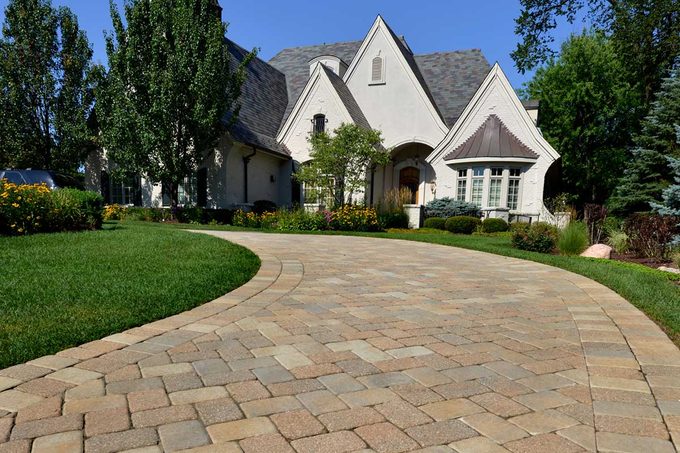
Individual bricks or pavers provide a top-end driveway material, combining high durability with aesthetic appeal and easy customization. Clay bricks have a shorter lifespan than concrete or stone pavers. All three types can be easily removed and replaced if damaged.
Pros
- DIY friendly: Of all the options, the paver driveway is the most DIY friendly. It’s still a fair amount of work, but it doesn’t require heavy equipment.
- Flexibility: Even better able to withstand earth movement than concrete.
- Longevity: Expect a lifespan of up to 50 years for brick, and up to 75 years for concrete or stone.
- Pattern variety: Bricks and pavers, in a multitude of colors and shapes, can be laid in countless patterns.
- Sustainability: Clay bricks and stone pavers have a reduced environmental impact if locally sourced.
Cons
- Flexibility: The same properties that allow it to withstand the ground heaving and settling means that individual pavers may sink or stand proud and need to be adjusted. (The better the original install, the less of a problem this will be.)
- Cost: There’s a huge range of prices for paver driveways. Individual pavers can cost anywhere from $2 to $15 each; add in the substrate and labor and the final price will end up between $8 and $30 per square foot installed. The final cost depends on the look, style and pattern you choose.
Stamped Concrete Driveway

Stamped concrete driveways mimic the look of pavers through the use of imprinted patterns and stains. Providing high durability, they cost somewhere between standard concrete and a full paver driveway.
Pros
- Cost: At $10 to $12 per square foot installed, stamped concrete is more affordable than natural stone, brick or concrete pavers
- Appearance: Stamped concrete has an almost unlimited range of styles and appearances.
- Durability: Should last approximately as long as a regular concrete driveway, but it’s possible for the decorative stamping and staining to fade before that.
- Climate: Stamped concrete is a versatile material, well-suited for any climate.
Cons
- Cracks: All concrete will crack eventually.
- Maintenance: Repairs can be difficult to blend in.
- Not DIY friendly: Installation requires skill with concrete as well as stamping and staining. Because the driveway is usually poured all at once, even small mistakes can be noticeable.
- Sustainability: Stamped concrete has the same environmental issues as traditional concrete.
Gravel Driveway
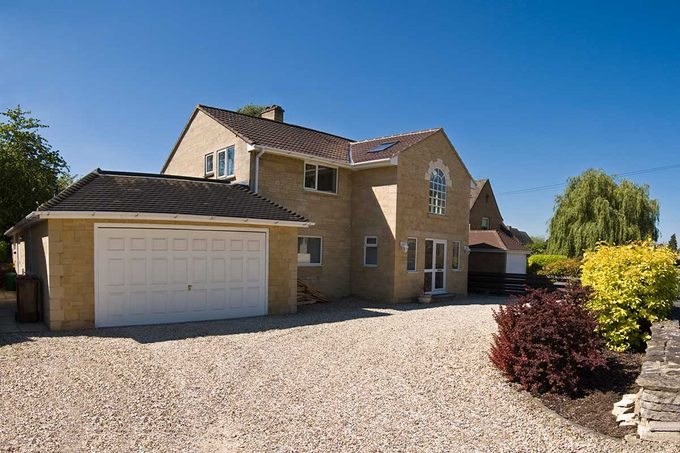
Gravel driveways can look simple, or they can be part of a complex and meticulously designed entryway. A good choice for warmer climates, the gravel stones are likely to outlive your home. But over time the gravel will be spread across the lawn and street, requiring the occasional top-off and leveling.
Pros
- Cost: At $1 to $3 per square foot installed, gravel is the most affordable option on this list.
- Options: There are lots of gravels, with different colors and sizes.
- Sustainability: Gravel is a naturally occurring material. It has the same water permeability as far more expensive paver options at a fraction of the cost.
- DIY Friendly: As long as you can get the base material and top-stone delivered, spreading it is relatively simple for small driveways. (The savings might be less than you think, since pros use heavy equipment to make short work of things.)
Cons
- Maintenance: Ruts and depressions will eventually form. If your driveway is sloped, the loose gravel will inevitably make it out to the street.
- Climate: Very difficult to keep clear of snow. Best for regions with little or no snowfall.
- Dirt: Gravel generates dust and debris, similar to driving on a dirt road. That dust has to settle somewhere, most likely on your car and the side of your home.
Permeable Paver Driveway
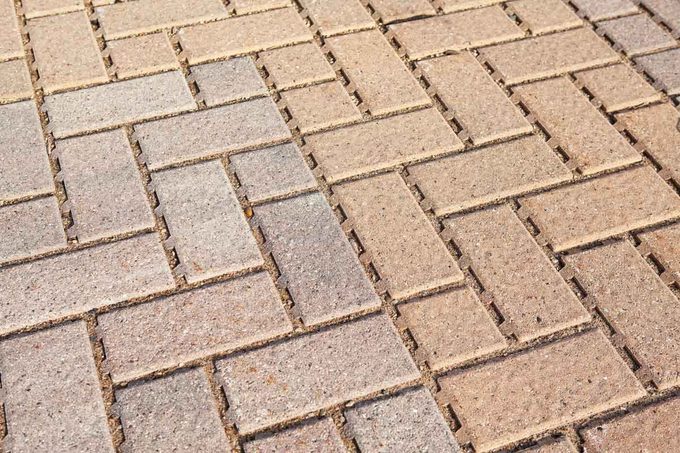
Permeable pavers are a newer technology that is beginning to catch on with a wider audience. Designed with engineered holes, the pavers allow rainwater and snow melt to flow through to the ground below. This has multiple environmentally beneficial side effects, as well as practical advantages. (There is also permeable concrete and asphalt with tiny pores to allow water penetration, but here we’ll focus on pavers.)
Pros
- Water permeable: This means less cracking, spalling and puddling. It also means less ice.
- Sustainability I: Permeable surfaces hold less heat, which means they don’t create a hot bubble of air directly in front of your home. It’s better for the environment and may lower your cooling bill.
- Sustainability II: Less storm drain runoff and less need to water the lawn, benefitting the environment and you.
Cons
- Soil dependent: If you have dense clay soil, that driveway water will penetrate the pavers only to pool on top of the soil. Additional work will be needed to get it where you want it to go.
- Cost: Permeable paver driveways run anywhere from $20 to $40 per square foot installed. Just like traditional pavers, it’s dependent on material and pattern selection.
- Maintenance: The porous surface can become clogged. Plan on annual pressure washing or vacuuming to clear out the little holes.
- Snow: The same reason permeable surfaces don’t hold heat means that it is more likely to accumulate snow. Of course, once the snow melts, that water will drain away before icing over.
Turf Driveway
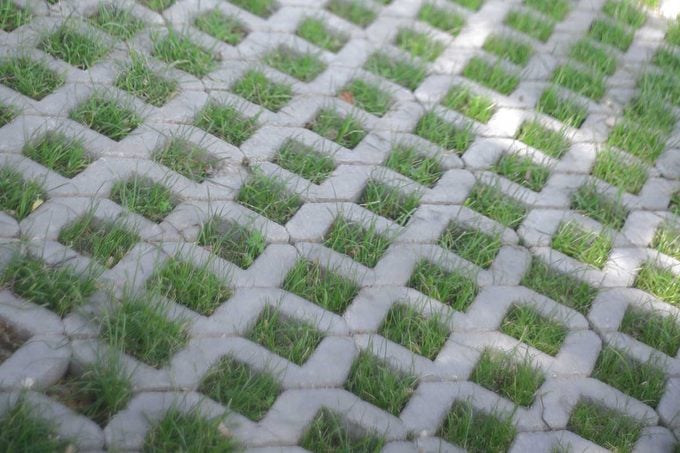
Another recent innovation, turf driveways use permeable pavers with holes broad enough to permit grass or ground cover plants to grow and flourish. It can have the look of a blend of pavers and turf, or appear to be a normal lawn but with reinforcement to avoid ruts and divots caused when parking on grass.
Best suited to a warm climate where the green grass will last and snow isn’t a problem, a turf driveway is an eye-catching and innovative driveway technology.
Pros
- Beauty: The attractive, streamlined, natural look of turf driveways is their major selling point.
- Sustainability: Turf drives are even cooler than other permeable surfaces.
Cons
- Cost: $10 to $30 per square foot installed, mostly determined by the type of paver you select.
- Maintenance: They’re an extension of your lawn, so watering and weeding are required.
- Lifespan: The broader openings cause the pavers to wear down faster. Longevity depends on the pavers selected, but 10 to 15 years for most residential driveways is a good estimate.
- Uneven footing: The grass/block surface isn’t friendly to wheelchairs or high heels.
- Climate: If you have to shovel snow, it will feel like you’re shoveling a lawn.
No comments